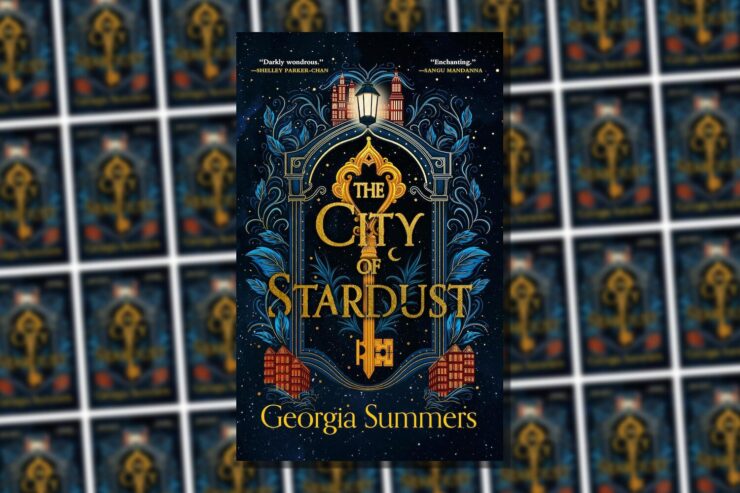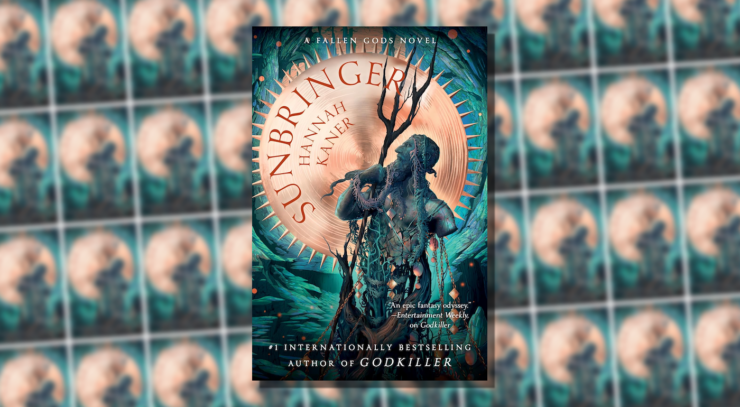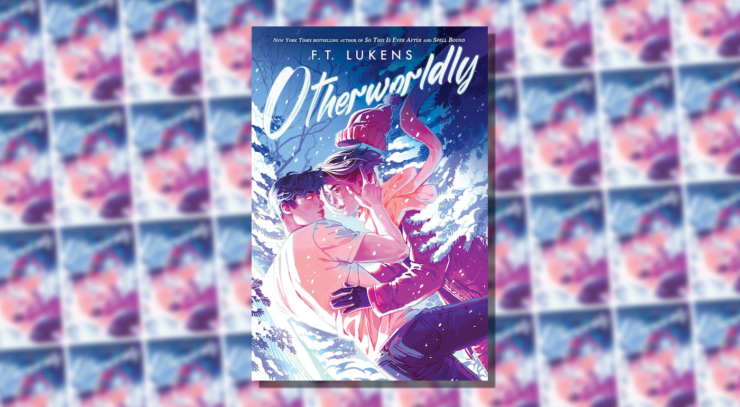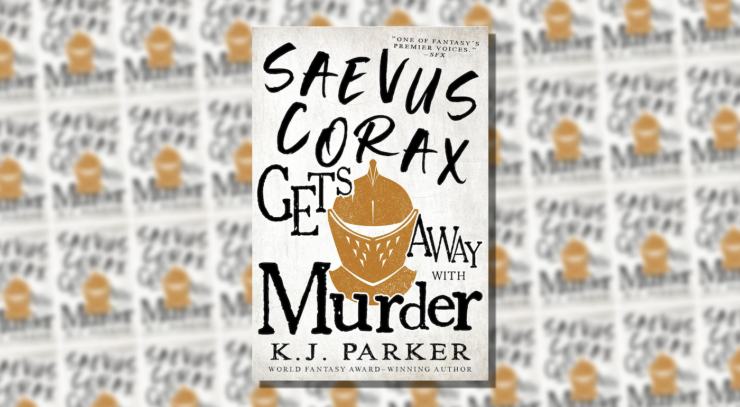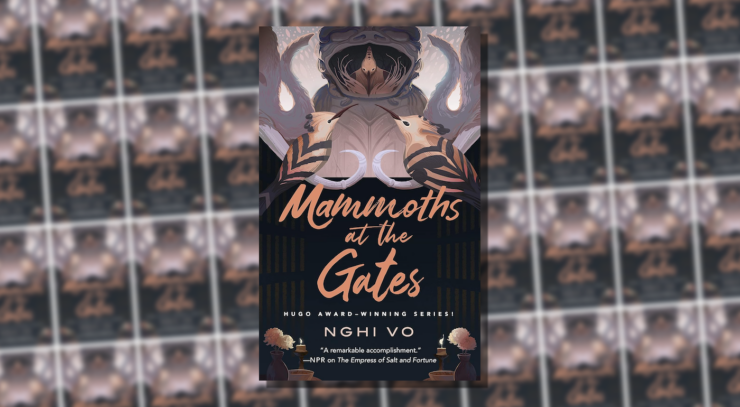Half a life ago, I read the first part of Mark Z. Danielewski’s House of Leaves for the first time. I was doing so inside my bedroom, the door closed, while my then-roommate watched television in the other room. After reading 70 or so pages of Danielewski’s novel, I became deeply unsettled, terrified that if I went to open the door, the rest of the apartment wouldn’t be there and instead something completely unexpected would be.
The idea that a door could lead somewhere other than its predictable destination can be used for effects both horrific and freeing. Chuck Wendig’s The Book of Accidents and Joe Hill and Gabriel Rodriguez’s comic book Locke & Key both abound with ominous doorways; read Neil Gaiman’s Neverwhere or Alix E. Harrow’s The Ten Thousand Doors of January and you might find yourself metaphorically transported in a far less unsettling way.
About three-quarters of the way through Georgia Summers’s debut novel The City of Stardust, Summers makes with a setpiece that neatly encapsulates the charms of this expansive novel. Violet Everly, the novel’s protagonist, asks a favor of Caspian Verne, an aristocrat with ties to magical undergrounds and a morally gray disposition. In the paragraphs that follow, Caspian calls in a favor from another character; that character calls in a different favor from a different character; and eventually, a package arrives on yet another character’s doorstep—a package that could help Violet elude the curse that’s haunted her family for generations.
This is a novel with travel to other worlds at its heart, yet as this sequence demonstrates, that same kind of literal traversal can also take place on a metaphorical level. It’s one of a few places here where Summers pushes past the familiar to find something refreshing. There’s also a very old story that’s retold a few different ways over the course of the novel—but that’s something we can discuss later. The City of Stardust is the kind of novel that does a lot of things well, but sometimes does that in a way that makes its more frustrating aspects feel that much more noticeable.
When we readers first encounter Violet, she’s a small child, abandoned by her mother Marianne in the care of Violet’s two uncles, Ambrose and Gabriel. The specific reasons as to why Marianne vanished are left unsaid initially, but one can assume it has something to do with the sequence of disappearing children with which Summers opens the novel. When Violet is 12, a mysterious woman named Penelope comes calling, alluding to a debt the Everlys owe her, and telling the brothers that they have 10 years to find Marianne, or something unspeakable will happen to Violet. Penelope also has a child with her named Aleksander; he and Violet wander the house while Penelope converses with Gabriel and Ambrose.
Exactly what’s going on is couched in mystery, and Summers effectively builds suspense around some big questions: why did Marianne leave? Can she be found? What does Penelope want with the Everly family? What’s the nature of the uncanny substance called “reveurite” that Penelope and Aleksander have access to? And who or what, exactly, is the “monster” that Penelope visits annually?
Buy the Book
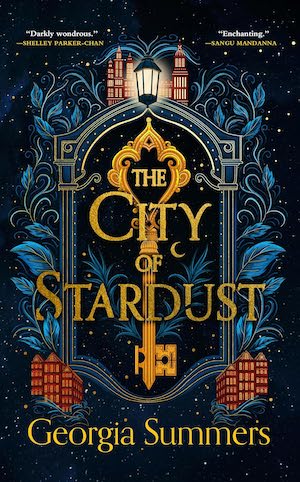

The City of Stardust
Some of these questions are answered elliptically by the scenes that focus on young Aleksander, in which we learn that he and Penelope reside in a city called Fidelis, and that the scholars there make use of different keys to travel between worlds. It’s there, too, that the reader learns in passing that there are certain “vital resources” that Fidelis’s scholars “simply cannot recreate in the city.” This, too, proves significant.
Soon enough, Violet is 21 and working in a coffee shop; it’s then that a young man she considers “unfairly pretty”—who, naturally, turns out to be Aleksander—walks back into her life. If you suspect that his motives might not be on the level, you’re correct; he’s there on behalf of Penelope, who’s been abusing him for much of his young life in order to meld him to her will.
Violet’s search for her lost mother leads her across the globe, including stops in Prague and Vienna. (And, as a big fan of Vienna’s MuseumsQuartier—I have a mug from it on my writing desk, in fact—I appreciated that Summers set one scene in which Violet chats with an old colleague of Marianne’s there.) While all of this is happening, Penelope monitors her and works towards a goal of her own; caught between them is Aleksander, whose tormented history and shifting allegiances make him the novel’s most compelling character.
If there’s an issue here, it’s that few other characters are anywhere near as interesting as the core trio. Neither Ambrose nor Gabriel feels all that critical to the plot. The aforementioned Caspian Verne, who offers an intriguing “none of the above” moral choice to some of the dilemmas raised within the novel, also feels more like a means to an end than, say, the Lando Calrissian of this fictional setting, with all the roguish charm that that implies. In some cases, this feels intentional—and I’ll try to be vague here, but the spoiler-averse might want to skip to the next paragraph. Violet’s search for her mother makes Marianne a character increasingly defined by other people’s perceptions of her. It feels as though we’re building to a big reveal—like, say, to Lyra’s understanding of her parentage in the His Dark Materials trilogy, a work that shares some DNA with this one. By the end, though, the novel is less about its protagonist’s search for an absent mother than her own coming of age and reckoning with her family’s legacy.
At times, the pacing of The City of Stardust feels like a trilogy’s worth of plot condensed into the space of a single novel. The case of Yury, a supporting character who begins hunting Violet for reasons of his own, is significant here. He’s the subject of magical experiments that he’d hoped would bring transcendence and have instead left his body wounded and devastated; certain descriptions of his form introduce some skin-crawling body horror into the mix. His final appearance, too, is grandiose and gothic in a way that this novel largely avoids, and while he’s less of a compelling antagonist, he’s also more chaotic than the ruthless and methodical Penelope. And yet his role in the book also feels oddly truncated; he’s a figure of chaos who is rarely surprising, which makes for an odd combination.
If my criticisms of The City of Stardust read like warnings, they shouldn’t: This is an immersive read with a trio of compelling figures at its core. It does a lot of things well—but because of that, it makes the elements of it that don’t hum as keenly feel that much more apparent. Summers understands the appeal of an elementally simple concept: a door that leads somewhere other than where it’s supposed to:
In the sliver between the door and the frame, a city sprawls below, as though Violet’s suddenly standing on the edge of a vast cliff. Snow falls in heady fat flakes, clustering at the edge of the doorway. Rooftops sparkle white, illuminated by honey-colored lamplight. Stars, brighter and more numerous than any she’s ever seen, in constellations Violet has no name for.
That aspect of this novel gives it a compelling energy that sustains it throughout—even if it does feel like some narrative doors weren’t opened as widely as they could have been.
The City of Stardust is published by Redhook.










